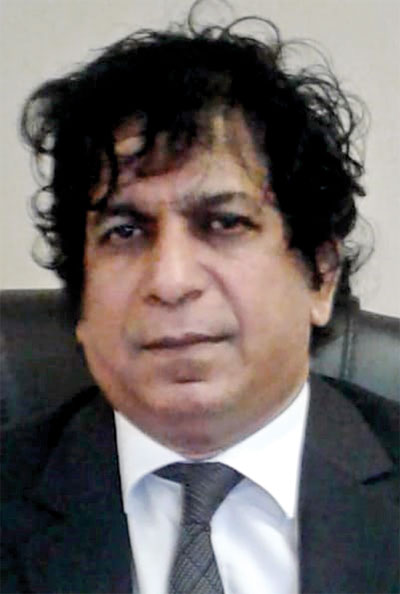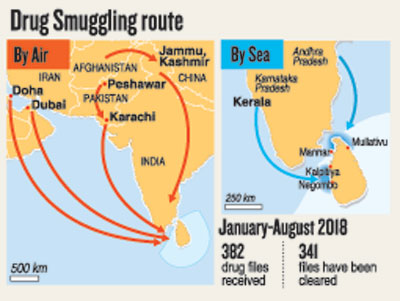News
Drug trafficking and money laundering go hand-in-hand, says SG
With Sri Lanka becoming a transit hub in global drug trafficking, tying up drug detection to money laundering is the call of the hour, says the Solicitor General and the Acting Attorney General Dappula de Livera.

Solicitor General Dappula de Livera
Citing the best practices of many jurisdictions the world over, he called for a holistic approach to drug trafficking investigations, as drug detection and money laundering investigations go hand-in-hand.
Due to the absence of such an approach, “unfortunately most drug sharks go scot free,” the SG said, insisting that money laundering was very much a consequence of drug trafficking, which was essentially a financial crime for monetary gain. “One kilo of heroin costing 12 million rupees speaks for this fact,” Mr. de Livera said, urging the Police Narcotics Bureau (PNB) to look at its structures afresh in this regard.
“The PNB is not equipped to deal with money laundering investigations and this arm has to be empowered to do so urgently,” the SG said. He pointed out that one of the objectives of introducing anti-money laundering legislation was to fight drug trafficking.
He lamented that despite the country having in place an effective legal framework to fight crimes that thrive on one another, investigators had failed to exploit the legal provisions.
When there was a mandatory minimum sentence stipulated for drug possession and trafficking in Section 54 of the Poisons, Opium and Dangerous Drugs (Amendment) Act, imposing of non-custodial sentences for cases involving lesser quantities of drugs was utterly unsatisfactory, Mr. De Livera said.
“The alarming level of drug trafficking is a serious issue and when we find that sentencing is not adequate and contrary to the law, we move the courts of law either in revision or in appeal. We have proactively moved courts and several cases of this nature are pending. Similarly, where a case has ended up in an acquittal unfairly, we could still call for an appeal,” he explains.
The AG’s Department, apart from its prosecutorial functions, provides advice on request to the major drug fighting agencies, including the PNB, the Excise Department and the Customs Department.
The collective effort to fight drug trafficking in the country can be given more muscle, if a proper National Action Plan and a Task Force involving all stakeholders can be realised, observed the Solicitor General. “What the country needs is a consolidated and a concerted effort in the exercise,” he added.
The country now being “a feeder of drugs to other countries” was increasingly becoming a consumer point as well, he said. “We are not a hard-drug manufacturing country. Most of the narcotics drugs such as heroin and cocaine are sourced from Afghanistan, Brazil and Pakistan. Looking at the quantities detected which are in excess of local consumption, it is suspected that the trafficked drugs are for other destinations such as the Maldives, Thailand and Indonesia. The recent detection of cocaine which came with a sugar consignment from Brazil speaks for the fact.”
The free floating of drugs at peripheral levels from cannabis and heroin to more sophisticated drugs in pill or liquid form, indicates that the country was becoming a consumer point of drugs, said Mr. De Livera who cited the examples of many large building construction sites which have become “hotbeds” of drug abuse.
The kiosks near construction sites and unregulated tourist resorts had also been identified as possible agents of drugs, he said. “Drug traffickers seek transit points where the system can be abused,” the SG said, citing the lack of a strong detection, the inadequacy of the law enforcement regime and weak border control as contributory factors from Sri Lanka’s perspective, apart from the strategic location of the country with porous shores.
Additional Solicitor Genera Ayesha Jinasena, who is the Senior Supervising Officer in charge of Drug Trafficking Offences at the AG’s Department, called for a detection mechanism with more teeth. She told the Sunday Times that a mandatory procedural scanning mechanism in the ports for containers was imperative for a higher detection rate. “The market value of heroin is around 12 million rupees a kilo and detectionn are made on tip-offs or on suspicion. It is suspected that large quantities go undetected owing to the absence of a mandatory scanning mechanism.”
The strategies devised by kingpins to mislead the law enforcement authorities make it difficult to establish a prima facie case against them, she said. The use of hired vehicles, deploying of persons unknown to each other in the network and transiting of drugs in the high seas through fishermen are some of these strategies. “The investigators need to be far ahead of the perpetrators,” the ASG said. “Drugs are imported by sea and air and more often than not it is the couriers who are caught in the law net but not the big fish, so to say”
The conviction rate for drug trafficking, (an offence entailing the death penalty for the possession of hard drugs in excess of two grams) is about 75% said Ms. Jinasena.
The numbers include both local and foreign traffickers. It is learnt, that from January to early August this year, of 382 drug files received, 341 files have been cleared.
Laws delays and incomplete files received by the Attorney General’s Department from the local police had significantly contributed to the backlog of advice files on drug trafficking, said the ASG, adding that a considerable number of these cases had now been cleared.

